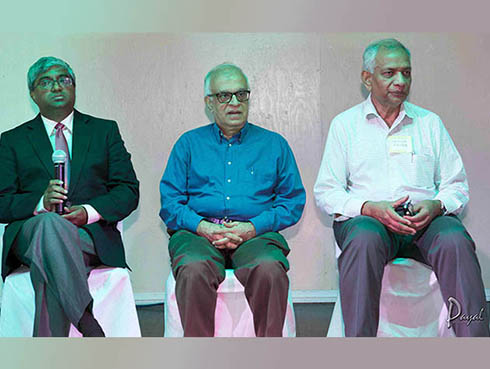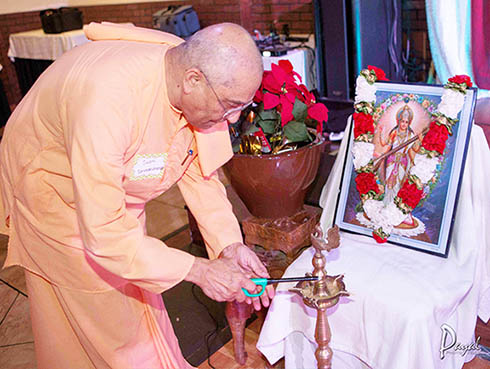
BY NIMMI RAGHUNATHAN
ARTESIA, CA – The Dharma Civilization Foundation launched the Swami Vivekananda Endowment Fund on Oct.16 at Tara’s Himalayan Cuisine restaurant, here. The low key event was nevertheless a crowded one and the announcement of the fund with seed money of $100,000 was greeted with quiet enthusiasm.
ARTESIA, CA – The Dharma Civilization Foundation launched the Swami Vivekananda Endowment Fund on Oct.16 at Tara’s Himalayan Cuisine restaurant, here. The low key event was nevertheless a crowded one and the announcement of the fund with seed money of $100,000 was greeted with quiet enthusiasm.
The fund, as explained by the founder of DCF Dr.Manohar Shinde and its Executive Vice President Kalyan Vishwanathan aims to create, “a community of scholars” which has a deep understanding of Dharmic traditions. They said they want to do this through research and dissertation fellowships, conference grants, publication of books and instituting a ‘scholar of the year’ award. The dollar amounts for these varied and went all the way up to $40,000. The fund is also open, to setting up within its auspices, gifts and grants in individual, family or donor names. In the Q&A session that was at the tail end of the program, interest was shown by audience members with a pledge for establishing a research scholarship and support for the ‘scholar of the year’ award. DCF projects that the fund will grow to $5 million by 2020 and envisions 108 PHDs in the next decade.
The two DCF officials made clear that selection for any funding would be rigorous and an advisory committee would be established soon. Among the criteria for selection for all this, was what they termed as, “vision alignment.”
Coming fresh off the UC Irvine fracas, where the university turned down the $1million pledged under the umbrella of the organization for the setting up of a chair, DCF was forthright that it had failed but as the organization’s Sucheta Kapuria put it, considered it a, “small road bump.” She went on to say, “lessons have been learned.” Among them: to more carefully identify campuses that are hospitable and to engage not just with one university official but the entire management.
Rajiv Malhotra, author and founder of ‘Infinity Foundation’ which seeks to have a second look on how the Indian civilization is perceived in the West, in his keynote speech, said that failures were part of the process. His foundation has funded a slew of studies, courses, papers and chairs at US universities and he narrated his experiences explaining that it had not always been possible to control the narrative. Malhotra, who is recognized in academia for the work he does in bringing about a dialog with the West about India so it can shift away from old paradigms, stated, “you have to get even by studying their history. They have studied us.” He talked about the old system of Indian discourse, ‘purva paksh,’ which had been practiced for long, where it is mandatory for a scholar to study the alternate point of view and then get into an open debate. Pointing out that schools of philosophy like Vedanta had blossomed through this system, Malhotra declared it was time to do ‘purva paksh’ of western systems.
Earlier, the event opened with a lamp lighting ceremony in front of a picture of Saraswati, the Goddess of Learning and Knowledge by Swami Sarvadevananda of the Vedanta Society who then led in the chanting of “Shano Mitra,” the peace invocation.
DCF also took time to briefly address the work in progress including the talks going on to set up a Sri Sri Ravi Shankar, Art of Living chair at USC. Prof. Kundan Singh of Sofia University in the Bay Area also spoke at the event.
The two DCF officials made clear that selection for any funding would be rigorous and an advisory committee would be established soon. Among the criteria for selection for all this, was what they termed as, “vision alignment.”
Coming fresh off the UC Irvine fracas, where the university turned down the $1million pledged under the umbrella of the organization for the setting up of a chair, DCF was forthright that it had failed but as the organization’s Sucheta Kapuria put it, considered it a, “small road bump.” She went on to say, “lessons have been learned.” Among them: to more carefully identify campuses that are hospitable and to engage not just with one university official but the entire management.
Rajiv Malhotra, author and founder of ‘Infinity Foundation’ which seeks to have a second look on how the Indian civilization is perceived in the West, in his keynote speech, said that failures were part of the process. His foundation has funded a slew of studies, courses, papers and chairs at US universities and he narrated his experiences explaining that it had not always been possible to control the narrative. Malhotra, who is recognized in academia for the work he does in bringing about a dialog with the West about India so it can shift away from old paradigms, stated, “you have to get even by studying their history. They have studied us.” He talked about the old system of Indian discourse, ‘purva paksh,’ which had been practiced for long, where it is mandatory for a scholar to study the alternate point of view and then get into an open debate. Pointing out that schools of philosophy like Vedanta had blossomed through this system, Malhotra declared it was time to do ‘purva paksh’ of western systems.
Earlier, the event opened with a lamp lighting ceremony in front of a picture of Saraswati, the Goddess of Learning and Knowledge by Swami Sarvadevananda of the Vedanta Society who then led in the chanting of “Shano Mitra,” the peace invocation.
DCF also took time to briefly address the work in progress including the talks going on to set up a Sri Sri Ravi Shankar, Art of Living chair at USC. Prof. Kundan Singh of Sofia University in the Bay Area also spoke at the event.



 RSS Feed
RSS Feed
